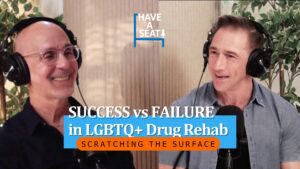Addiction, whether to alcohol, club drugs, or gambling, is a complex neurological disorder that affects the brain’s reward, motivation, and memory systems. Four factors distinguish addiction from other neurological conditions: compulsion, craving, consequences, and control.
Collectively known as the four C’s of addiction, they provide insights into the nature of addiction and offer a framework for effective intervention and support.
In this article, we’ll explore each of the four C’s in detail, examining their role in the addiction process and their implications for treatment and recovery.
LGBTQ-affirmative addiction treatment in Los Angeles. Call us today at 888.903.9898.
The Four C’s of Addiction
The four C’s of addiction were developed as a way to break down the complex nature of addiction into its core elements: compulsion, cravings, consequences, and control. These components have since proven valuable in identifying and describing addiction.
Compulsion
Compulsion is the overwhelming urge to use a substance or engage in a behavior, despite being aware of its harmful consequences.
For example, a person with alcohol addiction might feel compelled to drink, despite the risks to their physical well-being or personal relationships.
Compulsions result from changes in the brain’s reward system. Repeated exposure to addictive substances or behaviors triggers a release of dopamine, a neurotransmitter that reinforces pleasure. Over time, the brain becomes less responsive to natural rewards and needs addictive substances to experience pleasure.
Psychological factors such as stress, anxiety, and trauma can also influence the development of compulsions, as they heighten the brain’s sensitivity to the pleasurable effects of addictive substances or behaviors.
Craving
Cravings are a defining feature of addiction. They show up as a powerful urge to use a substance or engage in a behavior.
These urges can arise from both physical and psychological factors. Physically, they are driven by the body’s dependence, while psychologically, they stem from the desire to feel pleasure or avoid negative emotions.
Cravings cause significant distress, causing anxiety, restlessness, insomnia, and difficulty concentrating. Separately, environmental cues — familiar places, people, or situations associated with the substance or behavior — can also trigger these urges, making them even harder to resist.
Understanding cravings is key to successful recovery, emphasizing the need for strategies to manage triggers and prevent relapse.
Consequences
Addiction is also defined by the continued use of substances or participation in addictive behaviors, even when it leads to harmful consequences. These consequences can be physical, mental, social, and financial.
Physically, addiction may lead to serious health issues like organ damage. Mentally, it often correlates with higher rates of depression, anxiety, and low self-esteem. Socially, it can strain relationships with loved ones. Financially, addiction can result in job loss, debt, or even homelessness.
Recognizing these wide-ranging consequences is a crucial step in recovery, as understanding the impact of addiction can provide powerful motivation to commit to the recovery process.
Control
Losing control is a defining feature of addiction. As addictions worsen, people find themselves increasingly unable to regulate their substance use or addictive behaviors, even when they want to.
Loss of control results from neurological changes, particularly in the prefrontal cortex, which is responsible for decision-making and impulse regulation. When this area is damaged, people struggle to anticipate the consequences of their actions and become more impulsive.
Recovery requires rebuilding lost control, specifically developing coping mechanisms, improving decision-making, and repairing damaged neural pathways.
Seeking Professional Help for Addiction
Understanding the four C’s of addiction — compulsion, craving, consequences, and control — highlights the complex nature of addiction and underscores the importance of seeking professional help.
This is especially relevant for members of the LGBTQ community, who experience higher rates of substance addiction due to issues like discrimination, trauma, and mental health problems.
Given these unique challenges, choosing an LGBTQ-affirming treatment center is especially beneficial.
LGBTQ-affirming addiction treatment programs offer several advantages:
LGBTQ-specific care and support: These programs offer support from professionals experienced in working with LGBTQ people. Additionally, they provide access to specialized resources that address internalized shame and explore identity issues.
Community and belonging: These programs foster a sense of belonging by surrounding patients with members of the LGBTQ community who share similar experiences.
Tailored support for successful recovery: By customizing treatment to the needs of LGBTQ individuals, these programs increase the likelihood of successful, long-term recovery.
LGBTQ Addiction Treatment at La Fuente Hollywood
La Fuente Hollywood Treatment Center is located in Los Angeles and offers a safe and supportive space for LGBTQ people in recovery.
Our treatment approach emphasizes cultural awareness, diversity, and inclusivity. We’re also dedicated to understanding our community’s unique challenges, which allows us to provide the highest quality of care to everyone who comes to us for support.
La Fuente is here to help. Call us today at 888.903.9898.




